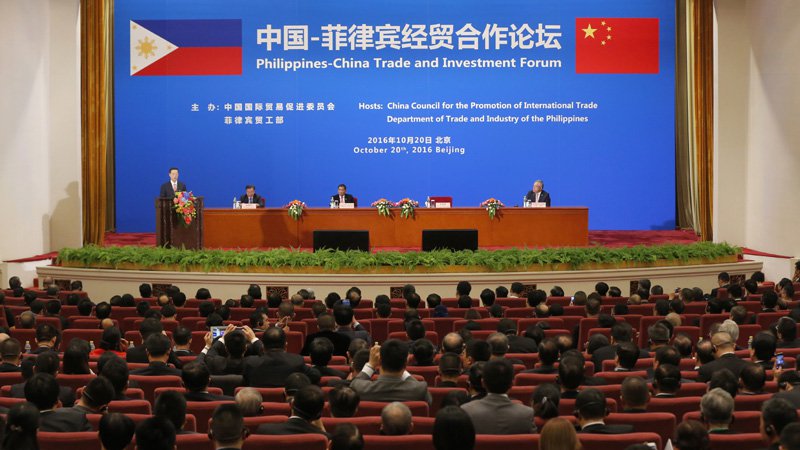
By Prof. Jose Maria Sison
Chief Political Consultant
National Democratic Front of the Philippines
October 17, 2018
If the traitorous Duterte regime is not stopped, it will make the Philippines a debt colony of China through unrepayable and high interest overpriced infrastructure projects and will surrender the sovereign rights of the Filipino people over the trillions of dollars worth of oil, gas, rare earth metals and marine resources in the West Philippine Sea through a joint exploration agreement with China.
It is grievously insulting to the Filipino people and to their national sovereignty and dignity that a big Chinese company responsible for the making of artificial islands in the exclusive economic zone and extended continental shelf in the West Philippine Sea is a big player in the build, build, build (BBB) program of overpriced infrastructure projects.
The Duterte regime has imposed an unbearable regressive tax burden on the Filipino people and cause the prices of basic commodities and services to soar, in order to raise tax revenues to finance the BBB program and the rise of bureaucratic corruption, military expenditures, import costs
and the debt service on the rapidly mounting public debt.
======================================================================
Chinese company banned by World Bank bags PH infrastructure project
By: Nikko Dizon – Reporter / @NikkoDizonINQ
Philippine Daily Inquirer / 02:03 AM October 26, 2016

A Chinese construction firm banned by the World Bank and a dredging firm that Beijing reportedly used for reclamation activities in the disputed Spratly Islands were among the companies that bagged big-ticket infrastructure projects in the Philippines during the recent state visit of President Duterte to China.
The contract of China Road and Bridge Corp. (CRBC) with the Bases Conversion and Development Authority (BCDA) is part of the $15-billion investment projects signed during Mr. Duterte’s visit to China
last week.
BCDA and CRBC will develop the Bonifacio Global City-Ninoy Aquino International Airport segment of the Metro Manila Bus Rapid Transit-Edsa project.
Since 2009, the World Bank has debarred CRBC from participating in all its funded or executed projects after an internal investigation found that it colluded with several other local and international companies on the bidding for the first phase of the Philippine National Roads Improvement and Management Program (NRIMP 1).
WB-sanctioned
CRBC is a subsidiary of China Communication Construction Co. (CCCC) Ltd., which in 2011, the World Bank also sanctioned as a result of CRBC’s fraudulent practices.
A check with the World Bank procurement and projects website showed that the debarment was extended to all firms “directly or indirectly controlled by CCCC” for all World Bank-funded or executed road and bridges projects, the multilateral agency said.
The sanctions against CCCC, its subsidiaries and CRBC will remain until January 2017.
As it turns out, other CCCC subsidiaries, like CCCC Dredging Co. and China Harbour Engineering Co. Ltd., were among the companies that
will undertake other big-ticket infrastructure projects in the country.
Dredging in Cebu
CCCC Dredging, the largest dredging company in the world, signed an investment project with Mega Harbour Port for the Cebu International and Bulk Terminal project.
But the Wall Street Journal, in November last year, reported that CCCC Dredging delayed its planned initial public offering in Hong Kong in 2015 after questions were raised about its alleged involvement in the land-reclamation activities of China in the disputed Spratly Islands.
The news report cited information from intelligence provider IHS Jane’s Defence Weekly that a CCCC Dredging ship appeared in the surveillance photos at one of the artificial islands being built by China.
Subic-Clark railway
China Harbour Engineering Co. Ltd. will partner with BCDA for the Subic-Clark railway project; the transportation and logistics infrastructure at Sangley Point by Cavitex Holdings International Container Terminal Services Inc.; the Davao coastline and port development project with Mega Harbour Port and Development; and the Manila Harbour Center reclamation with R-II Builders Inc.
Critics of governments that entered contracts with CCCC and its subsidiaries often cited their World Bank debarment and how it stemmed from a shady deal in the Philippines.
Open source data showed that other companies that were part of China’s multi-billion investment pledges to Mr. Duterte are saddled by corruption allegations, particularly SinoHydro Corp. and China CAMC Engineering.
But questions about the integrity of Chinese companies that the Duterte administration welcomed with open arms in Beijing last week have also surfaced the past few days on social media.
Flood control, island bridges
SinoHydro will partner with Zonar Construct for the Pasig River, Marikina River and Manggahan Floodway bridges and with One Whitebeach Land Development for the Ambal Simuay subriver basin flood control project.
PowerChina, which owns SinoHydro, will build with Zonarsystems link bridges for island provinces.
International Rivers, an
organization that advocates sustainable development to protect the world’s rivers,
described SinoHydro as the “world’s dominant dam builder.”
SinoHydro, a hydropower engineering and construction company, is allegedly involved in anomalous projects in African countries like Kenya, Uganda, Zimbabwe and Zambia.
‘Monument to corruption’
Quoting Transparency International, International Rivers described the Bakun Dam in Sarawak as a “monument to corruption.” It was built
by SinoHydro and the Malaysian government. The dam, which took five decades to build, displaced indigenous peoples.
China CAMC Engineering, which entered into a joint development project on renewable energy with Columbus Capitana, has been accused of alleged questionable dealings with the governments of Bangladesh, Nepal, Bolivia and Zambia.